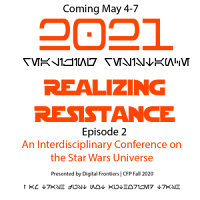I was excited to come across this call today from the SFRA news feed.
Realizing Resistance Episode II: Uncharted Galaxies
With the end of the Skywalker era of the Star Wars saga, and the emergence of spin-offs like The Mandalorian, Resistance, and Rebels, aca-fans from all disciplines have an opportunity to engage with nearly half a century of Star Wars media. As with our previous event, this conference aims to bring together scholars from across disciplines to examine Star Wars media as cultural texts. We invite scholarly and creative interventions with an explicit focus on themes of resistance and justice. How do these these films and other media objects contribute to, reflect on, or depart from broader contemporary cultural practices and social discourses?
Since 2019, both the political and media worlds have experienced dramatic shifts and disruptions, including the COVID-19 pandemic, the Black Lives Matter movement, a contentious U.S. presidential election, and an increasing sense of the vulnerability of democratic institutions and processes. Star Wars, as a cultural phenomenon, has also been embroiled in controversies and transitions, from reactions to The Rise of Skywalker and The Mandalorian to the emergence of Disney+ as a principle platform for the continuation of the Star Wars legacy. Star Wars has penetrated into the culture in surprising ways including martial arts classes offering lightsaber training, political protests that feature Star Wars iconography, the co-opting of the Empire and First Order by the alt-right, among many others. We encourage presentations that reflect on these contexts to offer new perspectives and innovative methodological and disciplinary approaches to Star Wars scholarship.
Digital Frontiers invites proposals of individual papers, panels, academic posters and infographics, media objects (critical making, comics, video, Twine, or performance), and methodology or other workshops. Topics may include but are by no means limited to:
- Expanding the Star Wars universe: where do we go from here?
- Genres far, far away: Star Wars as western, war story, dystopian fiction, caper movie, romance, etc.
- The Transmedia Star Wars: memes, video games, board games, RPGs, etc.
- Fan cultures and participatory practices.
- Star Wars Style: costume and fashion in the Star Wars universe.
- Animation as an artform and cultural object.
- Comics and animated series as canon
- The material culture of Star Wars: toys, branding, and collectibles
- Star Wars DH: computational and quantitative approaches to Star Wars scholarship
- Ahsoka Tano, Rey, Ventress, and other Women Warriors
- Queering Star Wars
- The Fall of Skywalker
- Deus ex Exegol: narrative studies and Star Wars
- The Star Wars Family: Malignant paternity, missing moms, toxic relationships
- “Much to learn, you still have.” Star Wars and Pedagogy
- Pop culture precursors
- Getting over “The Hero’s Journey”
- Monsters of Star Wars
Submit 250-word abstracts via this Google Form no later than midnight Central Time (US) on February 20, 2021.
Submit
All submissions will undergo transparent peer review. All participants will have the opportunity to publish their work in the RRII Proceedings in Unbound: A Journal of Digital Scholarship. Every effort will be made to accommodate international and early career and student scholars to facilitate their participation. All interactions are governed by the Digital Frontiers Statement of Inclusion and Accessibility.
This virtual conference will take place May 4-7, 2021. Registration will be Pay-What-You’re-Able with a recommended contribution of $45. Registration opens March 22, 2021.
Important Dates:
Submission Deadline: February 20, 2021
Notifications & Registration Opens: March 22, 2021
Conference: May 4-7, 2021
Collaborating Institutions
- The University Library of the University of Illinois at Urbana-Champaign
- The University of North Texas Libraries
- The Department of Rhetoric and the Program for Critical Theory at the University of California Berkeley
- The Departments of English and Environmental Studies at Aurora University
- The Department of Communication & Media Studies at SUNY Cortland
Organizing Committee
Bridgitte Barclay, Aurora University
Spencer D. C. Keralis, University of Illinois at Urbana-Champaign
Christina Knopf, SUNY Cortland
Samantha Langsdale, University of California Berkeley
John Edward Martin, University of North Texas
Sponsorships
We invite organizations and institutions to sponsor Realizing Resistance Episode II. A $250 sponsorship will add your branding to this page, include coordinated social media announcements, and your branding during the virtual event. Sponsors can share a video or other personal message to be played during the event. To purchase a sponsorship, visit our Square Store, or contact conference@digital-frontiers.org for additional information.
Connect
Follow @RealizeResist on Twitter for updates and conversations. Contact conference@digital-frontiers.org with inquiries.

